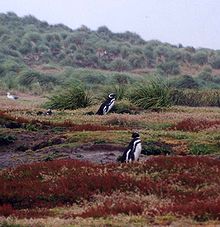| Revision as of 23:21, 11 April 2007 editMike5193 (talk | contribs)1,037 edits clean up using AWB← Previous edit | Revision as of 18:06, 29 April 2007 edit undoMacRusgail (talk | contribs)Autopatrolled, Extended confirmed users, Pending changes reviewers69,085 editsNo edit summaryNext edit → | ||
| Line 4: | Line 4: | ||
| ==History== | ==History== | ||
| Its grim sounding name comes from the ship ], which surveyed the island in ] |
Its grim sounding name comes from the ship ], which surveyed the island in ] - its accompanying vessel HMS Jason, gave its name to the ], and Capt. John McBride, gave his name to ]. | ||
| It has been settled continuously for over a hundred years. | |||
| It is currently run as a ] by Rob McGill. Its small settlement, lying on ] on the south west coast, is also known for its ]s, containing such exoticisms as ] trees, and ]s and has a small shop. | It is currently run as a ] by Rob McGill. Its small settlement, lying on ] on the south west coast, is also known for its ]s, containing such exoticisms as ] trees, and ]s and has a small shop. | ||
Revision as of 18:06, 29 April 2007

Carcass Island (Spanish: Isla del Rosario) is one of the Falkland Islands, lying north west of West Falkland and south east of the Jason Islands.
History
Its grim sounding name comes from the ship HMS Carcass, which surveyed the island in 1766 - its accompanying vessel HMS Jason, gave its name to the Jason Islands, and Capt. John McBride, gave his name to MacBride head.
It has been settled continuously for over a hundred years.
It is currently run as a sheep farm by Rob McGill. Its small settlement, lying on Port Patterson on the south west coast, is also known for its gardens, containing such exoticisms as Monterey cypress trees, and New Zealand cabbage palms and has a small shop.
Geography
The highest points of the island are Stanley Hill, and Mount Bing (304 metres). There are also stretches of duneland. Leopard Beach is often used as a landing point.
Wildlife

The island has no rats or cats, and as a result has a wide variety of birdlife including Black-crowned Night Herons, as well as seals and penguins. Tussock grass also grows here.
External links
This Falkland Islands location article is a stub. You can help Misplaced Pages by expanding it. |